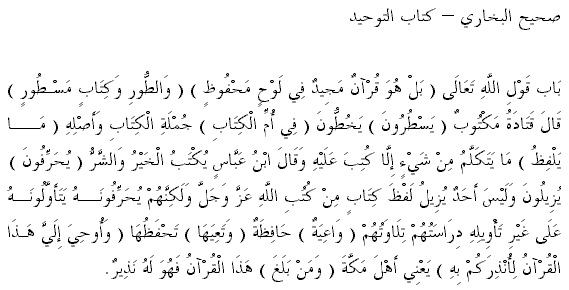
Sahih al-Bukhari, Kitaab Al-Tawheed, Baab Qawlu Allah Ta'ala, "Bal Huwa Qur'aanun Majeed, fi lawhin Mahfooth" (i.e. in Sahih al-Bukhari, Book "The Oneness of God", the Chapter on Surat Al-Borooj (no. 85), Verses 21, 22 saying, "Nay this is a Glorious Qur'an, (Inscribed) in a Tablet Preserved.") we find in a footnote between 9.642 and 643:
"They corrupt the word" means "they alter or change its meaning." Yet no one is able to change even a single word from any Book of God. The meaning is that they interpret the word wrongly. [... and he continues to speak about how the Qur'an is preserved ...]
This is the Tafseer (commentary) of Abdullah Ibn Abbas, one of the Sahaba (companions) and Mohammed's cousin. His opinions (because he is a Sahabi (companion)) are held to be above the opinions and commentaries of all other Sheikhs who are not Sahaba.
Since Ibn Abbas' above reference to "They corrupt the word" quotes part of Sura 4:46, it is not only a commentary on Sura 85:22, but also on the meaning of the Quranic charge against the Jews of corrupting the scriptures.
[This opinion by Ibn Abbas—as well as further authorities confirming it—is also quoted in the famous Tafsir Ibn Kathir (see below)]
The above quotation strongly confirms the results of various investigations of the passages in the Qur'an that speak about the earlier scriptures [*, *, *, *] and their textual integrity (and continuing authority).
Recently, this section was also published in a Muslim translation:
LV. The words of Allah Almighty, "It is indeed a Glorious Qur'an preserved on a Tablet." (85:21-22)
"By the Mount and an Inscribed Book" (52:1-2): Qatada said that "mastur" means "written". "Yasturun" (68:1) means "they inscribe", and the Umm al-Kitab (43:4) is the whole of the Qur'an and its source. [He said that] "ma talfizu" (50:18) means: "He does not say anything but that it is written against him." Ibn 'Abbas said, "Both good and evil are recorded," and "yuharrufuna" (4:46) means "they remove". No one removes the works [sic] of one of the Books of Allah Almighty, but they twist them, interpreting them improperly. "Dirasatihim: (6:156) means "their recitation" "Wa'iyya" (69:12) is preserving, "ta'iha" (69:12) means to "preserve it". "This Qur'an has been revealed to me by inspiration that I may warn you," meaning the people of Makka, "and all whom it reaches"(6:19) meaning this Qur'an, so he is its warner. (Source; underline emphasis ours)
For further, detailed discussion, see this article.
Complete quotation in Arabic:

Mujahid, Ash-Sha'bi, Al-Hassan, Qatadah and Ar-Rabi' bin Anas said that,
<who distort the Book with their tongues.>
means, "They alter (Allah's Words)."
Al-Bukhari reported that Ibn 'Abbas said that the Ayah means they alter and add although none among Allah's creation CAN REMOVE THE WORDS OF ALLAH FROM HIS BOOKS, THEY ALTER AND DISTORT THEIR APPARENT MEANINGS. Wahb bin Munabbih said, "The Tawrah and Injil REMAIN AS ALLAH REVEALED THEM, AND NO LETTER IN THEM WAS REMOVED. However, the people misguide others by addition and false interpretation, relying on books that they wrote themselves." Then,
<they say: "This is from Allah," but it is not from Allah;>
As for Allah's books, THEY ARE STILL PRESERVED AND CANNOT BE CHANGED." Ibn Abi Hatim recorded this statement ... (Tafsir Ibn Kathir – Abridged, Volume 2, Parts 3, 4 & 5, Surat Al-Baqarah, Verse 253, to Surat An-Nisa, verse 147 [Darussalam Publishers & Distributors, Riyadh, Houston, New York, Lahore; First Edition: March 2000], p. 196; online edition; bold and capital emphasis ours)
Ibn Kathir also wrote regarding surah 33:6:
<This has been written in the Book.> This ruling, which is that those who are blood relatives have closer personal ties to one another, is a ruling which Allah has decreed and which is written in the First Book WHICH CANNOT BE ALTERED OR CHANGED. This is the view of Mujahid and others. (This is the case) even though Allah legislated something different at certain times, and there is wisdom behind this, for He knew that this would be abrogated and the original ruling that was instituted an eternity ago would prevail, and this is His universal and legislative decree. And Allah knows best. (Tafsir Ibn Kathir Abridged (Surat An-Nur to Surat Al-Ahzab, Verse 50) [Darussalam, first edition, August 2000], pp. 643-644; online edition; bold and capital emphasis ours)
Islamic views about the Bible
Answering Islam Home Page